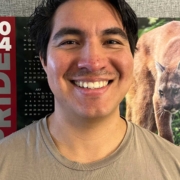International Wolf Center announces three recipients of Dr. L. David Mech Fellowship
Media Contact:
Grant Spickelmier
Executive Director
International Wolf Center
grant@wolf.org
Ely, MN – March 28, 2024 – The International Wolf Center is pleased to announce the selection of three outstanding individuals as recipients of the prestigious Dr. L. David Mech Fellowship. Named in honor of renowned wolf biologist and founder of the Center, Dr. L. David Mech, this fellowship recognizes promising individuals dedicated to advancing the field of wildlife research. The recipients of the 2024 fellowship are Kyle Martin, John Silva and Isabella Villanueva.
Each will be awarded with up to $10,000 to further their work in wildlife biology.
“We’re so honored to be able to offer this fellowship to the next generation of wildlife biologists,” said the Center’s Executive Director, Grant Spickelmier. “We want to thank our generous donors who’ve made this fellowship possible.”
Kyle Martin, a senior at Eastern Michigan University, expressed his profound gratitude upon learning of his selection. Hailing from Ypsilanti, Michigan, Martin is the first Eastern Michigan University student to receive the fellowship. His dedication to environmental conservation and his commitment to diversity and inclusion within the field exemplify the values upheld by the Dr. L. David Mech Fellowship.
Upon receiving the news, he said: “I was overwhelmed with a mix of emotions – excitement, gratitude, and a profound sense of honor. This recognition serves as a reminder of the potential for positive change and progress in breaking down barriers for underrepresented groups in outdoor recreation and conservation.”
Martin’s extensive background in ecological research and wildlife conservation, combined with his leadership roles within his university and community, made him a candidate for the fellowship. With aspirations to pursue a Ph.D. in Natural Resources at the University of Idaho, Martin is eager to contribute to the Idaho Wolf Project and make meaningful advancements in the field of wildlife biology.
John Silva, a student at Washington State University, was elated to discover that he had been selected as a recipient of the Mech Fellowship. Originally from Eagle Rock, California, Silva’s passion for wildlife conservation has led him to engage in diverse research endeavors, ranging from mammal spatial ecology to bird acoustics.
“I didn’t think I would be awarded as I applied thinking that there are much more qualified candidates than me, but why not? You never know what could happen and here we are today,” Silva said.
His eagerness to explore the world of wolves and his dedication to interdisciplinary research make him a promising addition to the Mech Fellowship cohort.
Isabella Villanueva, a recent graduate of Lincoln East High School in Lincoln, Nebraska, and is a junior pursuing her undergraduate degree at the University of Nebraska-Lincoln. She was equally surprised and grateful upon receiving the news of her selection. As she prepares to embark on her journey into wildlife conservation, Villanueva recognizes the importance of fostering collaboration and understanding among diverse stakeholders.
Through the Mech Fellowship, she aims to gain valuable experience in wildlife conservation and human dimensions, with the goal of promoting coexistence between humans and wildlife. Her passion for bridging the gap between scientific knowledge and societal needs aligns perfectly with the objectives of the fellowship.
The Dr. L. David Mech Fellowship provides recipients with the opportunity to conduct meaningful research, engage in collaborative initiatives, and contribute to the conservation efforts of wolf populations worldwide. For more information about the Mech Fellowship, please visit wolf.org/programs/mech-fellowship.
About the International Wolf Center:
The International Wolf Center advances the survival of wolf populations by teaching about wolves, their relationship to wildlands and the human role in their future. The Center offers innovative educational programs, supports scientific research, and fosters well-informed dialogue about the responsible management of wolf populations. For more information, visit wolf.org.




